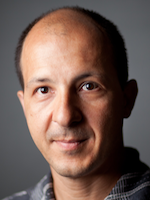Go to
Giacomo Indiveri
What should neuromorphic computing architectures be like?
Neural networks and deep learning algorithms are currently achieving impressive state-of-the-art results on computing tasks that operate on stored data sets. However, artificial computing systems are still vastly outperformed by biological neural processing ones for tasks that involve processing of sensory data acquired in real-time in complex and uncertain settings, and closed-loop interactions with the environment. This difference is remarkable especially when size and energy consumption are factored in.
One of the reasons for this gap is that neural computation in biological systems is very different from the way today's computers operate: it is tightly linked to the properties of their computational embodiment, to the physics of their computing elements and to their temporal dynamics. I will argue that hybrid analog/digital microelectronic circuits that use the physics of Silicon to directly emulate the biophysics of the neural processes they model represent a promising technology for building intelligent and energy-efficient autonomous cognitive agents. I will demonstrate examples of brain-inspired architectures that integrate massively parallel arrays of such circuits to implement on-chip on-line spike-based learning and computation, and will describe the advantages and disadvantages of these types of computing architectures compared to conventional computing systems, in this domain.
About the panel speaker:
 Giacomo Indiveri is a Professor at the Faculty of Science of the University of Zurich, Switzerland. He obtained an M.Sc. degree in electrical engineering and a Ph.D. degree in computer science from the University of Genoa, Italy. Indiveri was a post-doctoral research fellow in the Division of Biology at Caltech and at the Institute of Neuroinformatics of the University of Zurich and ETH Zurich. In 2006 he attained the "habilitation" in Neuromorphic Engineering at the ETH Zurich Department of Information Technology and Electrical Engineering, and in 2011 he won an ERC Starting Grant on "Neuromorphic processors: event-based VLSI models of cortical circuits for brain-inspired computation". His research interests lie in the study of neural computation, with particular interest in spike-based learning and selective attention mechanisms, and in the hardware implementation of real-time sensory-motor systems using neuromorphic circuits and VLSI technology.
Giacomo Indiveri is a Professor at the Faculty of Science of the University of Zurich, Switzerland. He obtained an M.Sc. degree in electrical engineering and a Ph.D. degree in computer science from the University of Genoa, Italy. Indiveri was a post-doctoral research fellow in the Division of Biology at Caltech and at the Institute of Neuroinformatics of the University of Zurich and ETH Zurich. In 2006 he attained the "habilitation" in Neuromorphic Engineering at the ETH Zurich Department of Information Technology and Electrical Engineering, and in 2011 he won an ERC Starting Grant on "Neuromorphic processors: event-based VLSI models of cortical circuits for brain-inspired computation". His research interests lie in the study of neural computation, with particular interest in spike-based learning and selective attention mechanisms, and in the hardware implementation of real-time sensory-motor systems using neuromorphic circuits and VLSI technology.
Secondary navigation
- EPFL Workshop on Logic Synthesis and Emerging Technologies
- Luca Amaru
- Luca Benini
- Giovanni De Micheli
- Srini Devadas
- Antun Domic
- Rolf Drechsler
- Pierre-Emmanuel Gaillardon
- Jie-Hong Roland Jiang
- Akash Kumar
- Shahar Kvatinsky
- Yusuf Leblebici
- Shin-ichi Minato
- Alan Mishchenko
- Vijaykrishnan Narayanan
- Ian O'Connor
- Andre Inacio Reis
- Martin Roetteler
- Julien Ryckaert
- Mathias Soeken
- Christof Teuscher
- Zhiru Zhang
- Symposium on Emerging Trends in Computing
- Layout synthesis: A golden DA topic
- EPFL Workshop on Logic Synthesis & Verification
- Luca Amaru
- Luca Benini
- Robert Brayton
- Maciej Ciesielski
- Valentina Ciriani
- Jovanka Ciric-Vujkovic
- Jason Cong
- Jordi Cortadella
- Giovanni De Micheli
- Antun Domic
- Rolf Drechsler
- Henri Fraisse
- Paolo Ienne
- Viktor Kuncak
- Enrico Macii
- Igor Markov
- Steven M. Nowick
- Tsutomu Sasao
- Alena Simalatsar
- Leon Stok
- Dirk Stroobandt
- Tiziano Villa
- Symposium on Emerging Trends in Electronics
- Raul Camposano
- Anantha Chandrakasan
- Jo De Boeck
- Gerhard Fettweis
- Steve Furber
- Philippe Magarshack
- Takayasu Sakurai
- Alberto Sangiovanni-Vincentelli
- Ken Shepard
- VENUE
- Panel on Circuits in Emerging Nanotechnologies
- Panel on Emerging Methods of Computing
- Panel on The Role of Universities in the Emerging ICT World
- Panel on Design Challenges Ahead
- Panel on Alternative Use of Silicon
- Nano-Bio Technologies for Lab-on-Chip
- Functionality-Enhanced Devices Workshop
- More Moore: Designing Ultra-Complex System-on-Chips
- Design Technologies for a New Era
- Nanotechnology for Health
- Secure Systems Design
- Surface Treatments and Biochip Sensors
- Security/Privacy of IMDs
- Nanosystem Design and Variability
- Past Events Archive

